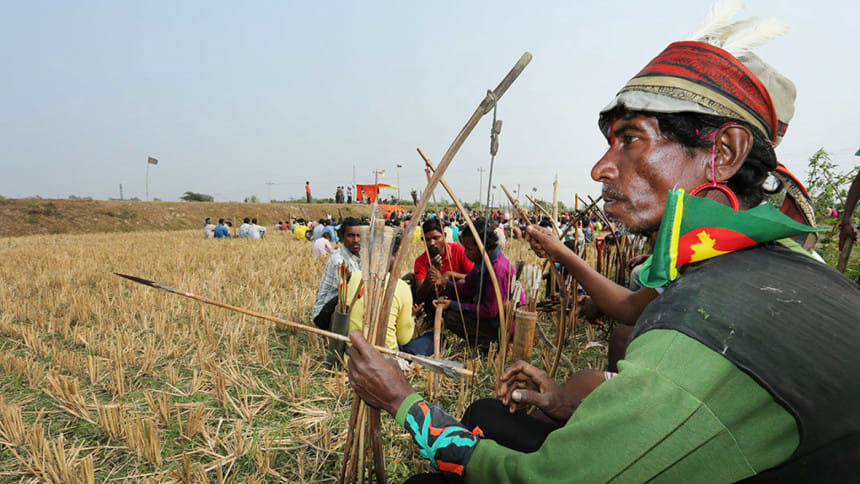The indigenous communities of the plains need urgent social protection

The indigenous communities of the plains of Bangladesh, including those in the tea gardens, are excluded and marginalised for their identity, occupations, casteism, culture, geographical locations, and various other reasons. A large percentage of them are deprived of equal opportunities and face wide-ranging social, economic and political disadvantages.
According to the Small Ethnic Groups Cultural Organisation Act 2010, last updated in March 2019, the number of small ethnic communities in Bangladesh stands at 50—11 in the Chittagong Hill Tracts (CHT) and 39 in the plains (before revisions, their number was 27). However, according to independent research, there are a large number of small ethnic groups (no less than the number seen on the official list) in the tea gardens and other areas outside the CHT who are not included in the official list. Before the March 2019 revision, only nine of the tea communities were on the official list, an indication that a large number of tea communities still remain invisible.
The 2011 population census enumerated the ethnic communities at 1,586,141, which was 1.1 percent of the population back then. Of them, the ethnic population was 845,541 in the CHT and 740,600 in the plains. There are no government statistics on communities added to the official list in 2019.
What is unique in these communities is that they are diverse in ethnic, religious and occupational identities and fulfil many of the criteria of being "socially excluded". The state has programmes to provide social protection to the ethnic, excluded populations and marginalised people who do not get the equal benefits of the economic progress the country has made. It is for their history, ethnic and religious identities, occupations, and colonial legacy that they have fallen behind.
Now, the challenge is how quickly these communities—who are deprived of equal opportunities, true education of their children, and development of capabilities and life skills—can catch up. Many of these communities, particularly in the tea gardens and those in other poverty pockets around the country, are so cut off from social relations and deprived of equal opportunities that occasional financial support is not enough. They are in need of special attention, and in many instances, they deserve positive discrimination to get out of their current situation.
However, because these communities are not uniformly poor and because their difficulties are not uniform, there is no single solution for all of them. Each community or group of communities faces some common difficulties; but they also face difficulties unique to their groups of communities. For example, tea communities of about half a million people are among the most marginalised, excluded and extreme poor of Bangladesh. The foremost of the key difficulties they face is wage deprivation, with a tea worker's daily cash pay being Taka 102 (USD 1.7) only. Needless to say, a tea worker's family income (cash pay plus fringe benefits) is far below the poverty level income, causing further deprivation from access to education, health services and nutritious food.
Social protection for the non-Bengali tea communities, who are "tied' to the tea gardens and still seen as "aliens", is not just a matter of some occasional financial support from the government. They are a labour class and one can imagine the effects of discrimination of the country's labour law and the non-implementation of some of its key sections. One of the discriminations in the labour law is that the tea workers can only unionise at the national level. An example of non-implementation of the labour law is that they get no gratuity that the labour law provides for. The most appalling for the tea workers, who are descendants of indentured workers brought by the British tea companies to work on the tea gardens, is that they don't own any land. They also do not own the houses they live in. It is only the state that can consider distribution of land to these landless people. It should be a top policy matter in order to introduce real social protection of the tea workers.
The Tk 5,000 or equivalent benefit given to a worker's family every three years from the Programme for Livelihood Improvement of Tea Garden Labourers, a social safety net programme (SSNP) directly targeted at the tea workers, is a drop in the ocean of impoverishment. They, of course, get some benefits from other SSNPs, but those are also very inadequate.
There are also a great number of other ethnic communities, who are on as well as outside the government list. Those excluded from the official list include—Bhuiya, Bindumondol, Buna, Chowhan, Ghatual/Ghatuar, Hajra, Hari, Kadar, Kairi, Kalwar, Karmokar, Koda, Kshatriya, Lyngam (a group among the Khasi) Modok, Noonia, Pal (also known as Kumar), Rajbhar, Rajbongshi, Robidas and Tanti. There is a strong indication that one-third of around 650,000 Kshatriyas in nine districts in the Northwest—Bogura, Dinajpur, Joypurhat, Kurigram, Lalmonirhat, Nilphamari, Panchagarh, Sirajganj and Thakurgaon—are Koch. Some of these communities are found both inside and outside the tea gardens.
While just a few of the plain land ethnic communities such as the Garo, Khasi and Monipuris are doing well in attaining education and living a relatively dignified life, most of the others live hand to mouth and many are considered social outcasts. As landless farmers, labourers, porters, fishers, craftsman, rickshaw and van drivers, small traders, etc, they need scaled support from the state-financed social protection programmes.
While the National Social Security Strategy (NSSS) approved by the cabinet on June 1, 2015 guides social protection, there are at least 125 social safety net programmes administered by 25 ministries and divisions. The budget for these programmes for the fiscal year 2019-2020 was Tk 74,367 crore, which was 2.58 percent of GDP and 14.21 percent of the budget. However, the largest shares of SSNPs go in pensions for retired government employees and freedom fighters (Tk 26,395.05 crore in 2019-2020). In the fiscal year 2020-2021, the budget for SSNPs has been raised to Tk 95,574 crore.
In the list of SSNPs, just one of the 125 Lump Sum Provision for Development of Special Areas (except Hill Tracts) is directly devoted to the plain land ethnic communities. This provision was started in 2013-14 and the budget goes to Development Assistance for Small Ethnic Communities Living in Plain Land, an initiative of the prime minister's office to provide development assistance to the plain land ethnic communities. Starting in 1996 with a budget of Taka five crore, the initiative has gradually scaled up financial support, with Taka 40 crores allocated for 2018-2019 and Taka 50 crores for 2019-2020. The initiative provides financial support for income generating projects. From 2016-2017, a few other marginalised groups such as the Dalit and tea workers have been included as recipients of benefits from this initiative. But given the population size of the plain land ethnic communities, the budget for this programme is still very small.
The beneficiaries, apart from development assistance, want the prime minister's office to provide support to deal with land disputes, human rights abuse and khas (public) land distribution to the ethnic communities. There is of course national legal aid services organisations (NLASO) that provide legal assistance to the poor. However, there is very little awareness about NLASO and its outreach is limited.
The ethnic communities also access benefits from some other major SSNPs such as Food for Work, Work for Money, Vulnerable Group Development, Vulnerable Group Feeding, Open Market Sales, Cash for Work, Gratuitous Relief, Test Relief Food, community based healthcare, stipends (primary, secondary and higher secondary), old-age allowance, and allowances for widows and distressed women. In the absence of disaggregated data, it is difficult to say how the ethnic communities benefit from these programmes.
At the end of the day, what the indigenous communities and tea workers really want for their social protection goes far beyond some financial benefits. The first and foremost of their demands is the recognition of diverse ethnic communities and their common identity as "indigenous". For the ethnic communities not to be excluded from SSNPs, there is a need of robust databases on their household income and asset situation. Special attention should be given to education for the children of the tea plantation workers and ethnic communities in particular. For instance, the government primary schools in the tea gardens outside Sreemangal upazila can be counted on fingers. The company schools (run by the owners of the tea gardens) are in very bad shape. Schools run by NGOs are also not stable. Enough access for the children of the tea and ethnic communities to the government schools can be instrumental in pulling these communities out of darkness.
At the same time, improving conditions for health and hygiene is an urgent need, particularly in the tea gardens where defecation in the open is still widespread. The single most important issue of the tea and ethnic communities is access to land. Resolving land rights issues and distribution of khas land to these communities is an urgent concern and high level policy matter. Granting customary land rights to those who live in forest villages is a long-standing issue. To resolve this issue, the government needs to sign the ILO Convention 169 that awards customary land rights to the communities who have been living on forest land for generations and do not have title deeds. Implementation of the Labour Act, 2006 and its amendment to end discrimination for the tea workers, is a timely demand of the tea workers. Passing of the anti-discrimination law by the parliament is no less important for the tea and ethnic communities, many of whom are considered social outcasts.
Philip Gain is a researcher and director of Society for Environment and Human Development (SEHD).
Email:[email protected]

 For all latest news, follow The Daily Star's Google News channel.
For all latest news, follow The Daily Star's Google News channel. 



Comments